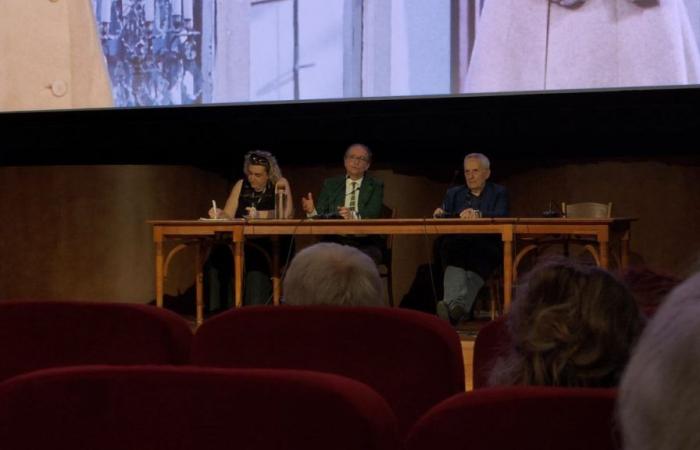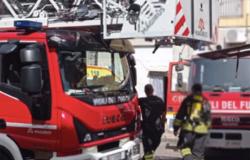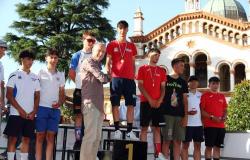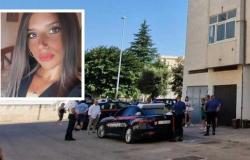The sixth day of Cinema Ritrovato 2024 gives us a special afternoon in the company of a special guest, but not new to Cinema Modernissimo: Marco Bellocchio! First called to open his film “Sbatti il mostro in prima pagina” – a work that has profoundly influenced the Italian cinematographic panorama -, then for a pleasant conversation with the director Gian Luca Farinelli and the actor-director Sergio Castellitto.
A Thursday that has very little to say about it Il Cinema Ritrovato 2024. 4.45pm, scorching heat, but “freshly selected” films, if I may say so: from the review Cannes Classic 2023chosen by Thierry Frémauxhere’s theopera 52enne by Marco Bellocchio, frighteningly current – Slam the monster on the front page.
“Slap the Monster on the Front Page”, 1972 (82′)
The director opened the event with a reflection on the genesis of the film: “I am entered the running projectafter – probably, but not sure – Sergio Donati (ed. screenwriter) he had retired from directing for reasons that are not entirely clear. It’s a unique film, directly based on historystrongly combined with the politics of those years. That was the basic idea.”.
The film, set precisely in 1972 (two years before the birth of “The newspaper”not to be mistaken for theentity present in the film), delves into the meanders of politicization of information and power dynamics that they crossed the Italy of the time. In particular, themurder of a girl that becomes political vehicle for the polarization of votes.
“It wasn’t real terrorism yet,” Bellocchio explained, “but the there was a germindeed. There was bad mood everywhere, even on the extreme left itself, controversy towards the PCI, said to be revisionist and non-revolutionary. A fuse.”
And the the press went hand in hand with total social and political confusionWe see it perfectly in the scenes of meetings of “The newspaper”fictional representation of the “Corriere della Sera”, publishing giant which at the time was a deus ex machina capable of influencing elections. Gian Maria Volontéin the role of news chiefuses the newspaper to condition mindsa particularly interesting question considering that real elections were taking place during filmingvisible in the film itself.
A peculiar coincidence
And a powerful symbolic element is the funeral of Giangiacomo Feltrinelliactivist who died following explosionhappened coincidentally on the days of filming and therefore included in the film. “It was thought to be a political deathwanted by the secret services,” commented Bellocchio, “when instead – it became known later – it was a random death because it exploded while planting bombs for an attack“. The Feltrinelli’s story it’s a game of fate which underlines the‘importance of a factor now the order of the day. That of the buffalole fake news.
The deeper reflection of the director Bobbio concerns the evolution of 1968 thoughtsand their legacy: “Some things I believed (and that I believed) different, now I no longer believe“. An admission deep, difficult, regrettablewhich shows a change of perspective that has matured over time.
The presentation is concluded on a light note. Gian Luca Farinellidirector of the Bologna Film Libraryhe jokingly told the audience: “We will interrogate you all”While Looker he added: “Will you tell us what you think? Is it bullshit, or is it interesting? – Watch it, it doesn’t last long!”amidst laughter.
Just before the lights went out, the director has greeted two important figures present in the room: the set designer Andrea Basilithat has contributed to the renovation of the new Modernissimo cinemae Gian Piero Brunetta, historian of Italian cinema.
Dialogue between Marco Bellocchio and Sergio Castellitto, moderated by Gian Luca Farinelli
The dialogue for Il Cinema Ritrovato offered the public a unique opportunity to explore two great minds of cinema and the artistic and institutional collaboration between two giants in the sector.
Bellocchio and Castellitto worked together on two and a half films (Religion time (2002) e The Wedding Director (2006), as well as for a dubbing of Lou Castel in The eyes, the mouth (1982) – where the actor I threaten the Roman to make him give up from work, failing.
Discussing how much i seemingly insignificant details of real life in cinema become particularly importantBellocchio told a anecdote about the 2002 film: “The scene of the blasphemy. Mi I was wondering how to behave. To do? Or not? I finally decided that if it had been written – and I had written it -, it had to be done.” To kill the tension, a consoling hug between Sergio and the profane. A hug that denies another, never happened, between Bellocchio and his deceased brother – “a regret”discussed in Marx can wait (2021).
Returning to episodes of working togetherCastellitto brought it out a nice one from the cylinder: “Ero terrified for a scene: I had three rottweilers on me, and to make them calm down they gave me some kibble to hold in your hand. And Looker? Looker laughed.“. “It was one very successful scene.” he answered, “Yes, of comic terror.“ the Roman then concluded, among them laughter from the audience.
Two (almost) mirrored careers
Farinelli he then brought to the public’s attention a curiosity: Bellocchio initially wanted to be an actor but became a directorWhile Castellitto had the dream of directing, but then began as an actor. And I walk (quasi) At the mirror of two. Castellitto explained his subsequent approach to directing: “I have become one only for Margaret Mazzantini. His literature has me driven to want to stage the images it brought to life in my head.“
Il roman filmmaker he then told the first years in the sector: “As a young man I worked in a company. I then followed the trail of boys my age, a river who wanted to enter the academy. When I announced to my family that I wanted to quit my job to become an actormy older brothers from the bottom of the table they didn’t understand the words – there were really a lot of us in the family. They asked “What he said? Doctor or actor? Actor”, and the frost fell.”
Looker instead it was inspired by Marlon Brandoespecially from his interpretation of The Harbor Front (1954). But, at the end of the day, his his only part as an actor was in Marx can wait. “Actorically I would be one of those who would be shocked to see uninterested people on set“, While for Castellitto to impress “the first spectators” – electricians for example – it always turned out fundamental to note the success or failure of the scene.
The latter then went into the concept in more detail: “For me the acting performance is total. L’actor becomes pen: in the score I play the violinprotagonist. There is the director, the screenwriter, but it is theactor who works.” Then quote two types of actors: the Mastroiannis, “cigarette, coffee and acting”and the Volontè, controversy who have something to say about everything that is written. In response, Bellocchio added: “Some actors don’t act, they talk. One of these is Mastroianni, the other is Castellitto“from i thanks from the colleague and the applause of the audience.
First actors and directors, now also presidents
Talking about their institutional roles, Castellitto mentioned the process for entry into the National Film Library – CSC, started in September 2023. He described the challenge of reconciling the cultural vocation of conservation and protection with that of training for the future: “It’s difficult and complicated, time will tell“. Per Bellocchiothat’s another story – many operations are delegated to people close to you, Farinelli first: “Maybe in something could change in the future“he then concluded.
A reflection on the treatment of culture in Europe and Italy in relation to politics ha brought the two and the two institutions closer which I am in charge of, opening up to future developments. And speaking of the Experimental Center, Looker he admitted his final mark for the directing diploma, 26/30. “Not even the best?” ha Castellitto jokedcausing hilarity and uproar.
Cinema and young people: contagiousness
The dialogue ended with a reflection on the contagiousness of cinema. Little Castle he said he discovered his son Pietro, still a teenager, watching The night (1961) by Antonioni on your cell phone. An interest that in the youth is born with time and must be allowed to mature in the channels you want. “This is a job that if you hate it a little, you can do it a little better”he finally observed, adding that the cinema’s contagious capacity must be supported.
Looker he talked about thedaughter Elena’s renewed interest in cinemaalthough initially it was oriented towards something else (since graduated in architecture). The actor and Roman director he then concluded: “Strange thing that the children then enter the cinema.”
“If Pietro and I both met in our thirties, we wouldn’t understand each other and we’d be pissed off. But if there is talentwhich for us must be recognized by othersthen what cinema be it.“
The meeting, full of situations question-and-answerended between loud applause and great respect for two highly esteemed elements on the world sceneleaving the warm audience of the Modernissimo it’s from The Cinema Rediscoveredfull in one Thursday afternoon, with reflections and curiosities to develop.
edited by
Francesco Pasquinelli






